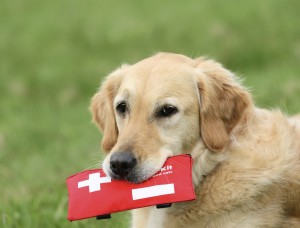Never Too Late To Learn: The Basics Of Pet First Aid
 In the middle of the night, you abruptly wake up to the sounds of your pet in painful agony. He or she might be sick, injured, or both, and you may react in a panic. You aren’t alone in wondering what to do next, but to avoid that cold sweat (and a terrible outcome for your pet), we suggest brushing up on the basics of pet first aid.
In the middle of the night, you abruptly wake up to the sounds of your pet in painful agony. He or she might be sick, injured, or both, and you may react in a panic. You aren’t alone in wondering what to do next, but to avoid that cold sweat (and a terrible outcome for your pet), we suggest brushing up on the basics of pet first aid.
Pet Emergencies
Sometimes, it can be difficult to negotiate the difference between a real emergency and mild health issue. Knowing what to look for in your pet will help you determine what to do next. Please call us immediately if you think your pet requires immediate care, or Angel of Mercy Animal Critical Care at (210) 684-2105 after hours.
Critical care is required for a sick or injured pet and our diagnostics can help illuminate the problems leading to your pet’s pain and suffering. Before transporting your pet, try to assess the situation as best as possible. A pet emergency can include wounds from fighting, injuries sustained from falls or vehicular accident, and toxic poisoning.
Symptoms Needing Pet First Aid
Your pet depends on you for more than food, shelter, and affection. Being aware of any of these symptoms and changes in behavior patterns can provide enormous insight. These symptoms should be considered a pet emergency and warrant, at the very least, a consultation call. However, if your pet is suffering from an obvious emergency, don’t delay in seeking care.
- Wound or cut
- Animal bite
- Eye injury
- Collapse
- Respiratory distress
- Difficulty urinating or defecating
- Seizure
- Vomiting or diarrhea
- Swelling
- Hives
- Venomous snake or spider bites
- Temperature
- Hunched over appearance, indicating abdominal pain
Building Your Pet’s First Aid Kit
We recommend that you keep your pet’s kit well-stocked and in an easily accessible location. You can decide how much to keep in your kit, but it might be worthwhile to make an abbreviated first-aid kit to keep in your car, in addition to the full kit in your home. simplify At the minimum, make sure your kit has the following, and use this supplies checklist:
- Gloves
- Disinfectant
- Ice pack
- The phone number for the Pet Poison Control Helpline
- Sterile saline solution
- Gauze and scissors
- Antibacterial spray (make sure to check the alcohol content)
- Cotton balls
- Q-tips
- Styptic powder, such as Kwik Stop
- Eye and ear wash
- Rectal thermometer
- Muzzle
- Kennel or leash
- Large blanket or towel
- Flashlight
Stay Prepared
Your pet means the world to you and deserves excellent care all the time, but especially in the case of an illness or injury. If you are not able to transport your pet for professional care, we suggest following these helpful instructions on apps such as Learning Pet CPR and Red Cross First Aid on your personal device.
Please let us know how we can assist you in preparing for a pet emergency, or in building a pet first-aid kit. We are always happy to help and look forward to answering any questions or concerns for your pet’s health and safety.


